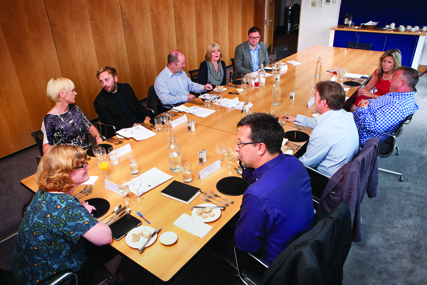THE PANEL
Claire Murphy consultant editor, Marketing
Tanya Hughes managing director, Talk PR
Warren Johnson managing director and founder, W Communications
Stuart Derrick contributor, Marketing
Rachel Friend managing director, consumer marketing, Weber Shandwick
Daniel Chester senior account manager, Marketing
Hilary Crossing managing director and founder, Focus PR
Graham Goodkind chairman and founder, Frank PR
Rhodri Harries managing director, Kaizo
Richard Medley managing director, Nexus Communications
PR has weathered the marketing recession better than most disciplines. The top 150 agencies in the UK grew their fee income by 9% in the past year, according to the annual ranking by Marketing's sister title PRWeek.
At a time when media choices seem to grow by the week, presenting ever greater challenges for marketers trying to achieve a consistent brand narrative, PR has emerged as a powerful tool for encouraging consumer engagement across the spectrum, particularly in the influential social sphere.
In the process, PR agencies are gaining a space at the coveted top table of marketing strategy, often for the first time. As well as presenting new challenges, the changing role has placed new demands on agencies. It is also altering the nature of the client/agency relationship.
Marketing has brought together a team of senior agency professionals to explore the emerging dynamics of these relationships and how they can be developed for more mutual benefit.
Pitching
Recent research by PRWeek found that the average number of months between pitches for in-house communications directors is 11 months. Although this applies to a distinct niche of PR, it surprises the agency directors around the table, who say their client relationships are longer, with many on long-term contracts.
However, there is recognition that pitching is a necessary evil and a constant one, especially as more work is of a project, rather than retained, nature. There is agreement that it is hard to turn down the offer to pitch for business, even if the odds seemed stacked against them.
Rachel Friend, managing director of consumer marketing at Weber Shandwick, claims many clients are required by procurement departments to stage pitches even when the client team is happy with its existing agency. 'We've done research and found that in 90% of the repitches we lost, the incumbent was returned,' she adds.
With the economy flatlining, entrepreneurial start-ups present opportunities for PR agencies, albeit risky ones, says Hilary Crossing, managing director of Focus PR. 'We want to work with clients who see a value in long-term relationships, but start-ups do not always have an appreciation that it could take years to build anything of value. They are too disruptive and have a short-term view.'
Weber Shandwick research into what chief marketing officers look for in agencies reveals the commercial reality behind some pitches, says Friend. 'They really want us to be fleet of foot, because they are working on a quarter-by-quarter, or even month-by-month basis. They want ideas that are revenue generators and lead to sales to get them through the month,' she explains.
Retained versus project work
In this pressured commercial environment, some clients are dissatisfied with existing ways of doing business. Whereas it suits agencies to have juicy retainers, clients can feel scarred by what they see as a monthly commitment to exorbitant fees.
As a result, the nature of relationships is changing as clients question the value of retainers, according to Graham Goodkind, chairman of Frank PR. 'Some of our clients pay a ticking-over fee, but the more substantial project fees don't kick in until activation starts. We call them retained projects. Clients only spend the money when they need to and it keeps agencies hungry.'
Friend says the retainer has value when PR agencies sit at the top table with other agencies at the planning stage. It motivates the team to come up with an integrated activation piece that will release extra budget, and it forces the agencies to work together.
There is also debate about the validity of the 'retained' and 'project' definitions. The consensus is that no client thinks of itself as a project, and that project work, properly carried out, could be the start of a longer-term client relationship.
Diversification
All marketing services companies are looking to extend their offer and claim a bigger share of client budgets. And the fact that the line is blurred so drastically between disciplines is presenting opportunities. 'There used to be a PR budget, but now there are chunks coming from social, digital and events,' points out Warren Johnson, managing director of W Communications.
Tanya Hughes, managing director of Talk PR, says the fact that PR managers can fund content creation has led her agency to reassess its offer. 'We've brought photography and video in-house. It was money that was going out of the door, but now we do it ourselves.'
All this is enabled by a client that is no longer monogamous, adds Goodkind. 'Client behaviour is now more open. It used to be that what the ad agency said went. Now they are flirting with other agencies and are in multiple relationships at any one time. They'll take good ideas and counsel from anywhere,' he says.
Mixed agency teams
With integration a real goal for many clients, PR now finds itself providing greater strategic input at an earlier stage. This ushers in a new area of relationship management, says Richard Medley, managing director of Nexus. 'We're sitting with all these other agencies, and clients want us to all get on. You have to be sure that in terms of that circle of trust around the table, people are supportive and collaborative rather than trying to land grab.'
Although it can be tempting to push the latest agency offering, it may be a better long-term play to be more modest, says Friend. 'We were involved in an integrated team for a client and it got to the stage where we were working out who did what,' she explains. 'One agency controlled the budget and some of the work went to the wrong people. We are now in the debrief stage, and the agency that grabbed work is in a weak position with the client.'
But while traditional demarcation lines are being erased, turf wars are still breaking out. Social and digital can provoke particular dog fights as technical agencies grab work that traditionally might have been handled by PR people, something that clearly riles the panel. The ongoing debate on who 'owns' social should have long ago been settled in PR's favour, it is felt.
However, just as PR has designs on more slices of the marketing pie, Rhodri Harries, managing director of Kaizo, says it can be outflanked by suppliers in other areas. 'We have seen social-media work carried out by a supplier that has more of a direct marketing background. It brings in some PR people, and they do it,' he claims.
Medley points out that there are distinct communication skills that are the preserve of traditional PR. 'Only one part of the agency set does what we do, which is spin on things in a second. Everyone else needs time to think about it. We absolutely should be leading social,' he says.
Client silos
Where agencies now see themselves as more rounded providers of communication solutions, client perception can lag. Agencies have reshaped themselves for the new consumer reality, with practitioners working across different channels to tell a brand story. However, clients often still perceive agencies as they were three or four years ago. 'The client likes what you do, but does not consider you for other stuff,' says Harries. 'There's a honeymoon period when you can push the envelope, but after that you are in a box, and it can become a vicious circle - you deliver what's expected of you.'
For this reason, Hughes says agencies need to educate clients about what they do. 'You can be an expert in any channel, but if the client doesn't understand this, it's a problem,' she argues.
Business networks
Technology has revolutionised the communications sector in the past 10 years, and change is ongoing with closed business networks such as Yammer, Huddle and Convo providing an opportunity to exert closer control over client/agency relationships.
Goodkind says Frank is trialling various options to ease day-to-day machinations such as sharing files, accessing footage, and commenting on and editing material. 'Within Frank, we're already all talking to each other, but it will work well with clients and between our international offices,' he adds.
Medley says Nexus is piloting a networked approach to crisis management, which brings people into a communications hub. 'It cuts through noise and gets people's attention. And there's potential for it to be used as a broader non-crisis tool for bringing marketing together,' he explains.
However, Friend warns that unless they are focused on making people's day jobs simpler, networks could end up confusing the issue. 'We're all on enough platforms as it is,' she says.
With so many communications options, clients can be like rabbits caught in the headlights. Crossing reveals that Focus is trying to return to the basics of account management - scheduled calls to clients and simply picking up the phone when they go into email overload.
What clients really want
Some new-business meetings are revealing clients who are underwhelmed with PR as a standalone discipline, says Medley. 'They want bigger and slightly more risky campaigns. The old model of PR with media at the core isn't satisfying them and they want to talk about "what if" scenarios.'
Clients have to be able to rely on agencies' judgement to take back to their own organisations, says Friend; if they can't, they will look like fools.
For Goodkind, it's about honesty. 'Twelve years ago, PR was famed for being full of bullshit and telling the client what they wanted to hear. It's not like that now. If a client can say to you that was rubbish, and you can tell them that a story is too introspective, then that's good,' he says.
As well as a fresh approach to relationships, there is need to look at how PR is evaluated. Too often metrics can be old-fashioned, with deliverables focused on old media. Today's output is much more complex.
Measuring engagement rather than simply column inches, clicks or tweets is essential, says Friend. 'We are working with neuroscientists and psychologists to look at the science of engagement, then carrying out engagement footprints with clients. Essentially, marketers want their brand to be loved, and we need to develop the tools to measure that,' she contends.
- What would you like to change about client-agency relationships?
Crossing Let us know the effectiveness in terms of sales, as that is ultimately the measurement of every campaign. Clients want us to be specific, but it's difficult to get the same from them. If a campaign has gone well, then the team deserves to know and be recognised.
Johnson Get us more involved in development and business strategy. Often you get a brief that's been through the funnel and it's written from that perspective. If we can understand the bigger commercial picture, then we can provide better counsel.
Friend Clients need to tell us their business objectives and give us the creative freedom to come back with a big idea that they will be open-minded about.
Medley I would like clients to be more open about their genuinely big, audacious goals, rather than the stuff in the brief that might be more functional and that they think is realistic. We might be able to deliver more than they expect.
Hughes Trust us with a broader brief. Make sure it's measured, because we have the metrics. We have to know what success looks like for clients.
Goodkind Understand that we are a partner and not a supplier, and you'll get more out of us.
Harries No matter what level your client is at in the business, they should focus more on commercial value rather than creative outputs.









